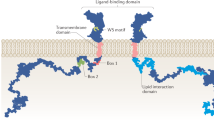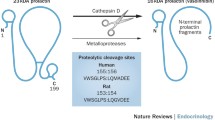Abstract
THE role of prolactin during growth of the mammary gland and in lactation is well established (see ref. 1 for review) and the antagonising action of progesterone on lactogenesis (but not on mammary growth) has been recognised2–4. A specific receptor for prolactin has been described5 and purified6 and it seems that the level of this receptor in the target cells is very sensitive to hormonal environments and might be one of the essential parameters which modulates the intensity of prolactin action. Titration of this receptor under controlled hormonal conditions has been mainly performed in the liver and its concentrations found to be sensitive to oestrogens7; this effect may be amplified or even mediated by prolactin itself8. We have shown9 that the number of prolactin receptors in the mammary gland of pregnant or lactating rabbits undergoes a sudden increase at the onset of lactation but that the Ka of the receptor–hormone interaction remains constant. The question arises as to which hormonal environment is required for this amplification; is the inhibitory action of high progesterone levels on lactogenesis associated with a reduction of receptor concentrations? We describe here a study of this possibility and of the positive regulation of prolactin on its own receptors in the rabbit mammary gland. We extend to the mammary gland the stimulating effect of prolactin on the levels of its receptors and demonstrate an antagonising action of progesterone on this process.
Similar content being viewed by others
References
Denamur, R. J. Dairy Res. 38, 237–264 (1971).
Kuhn, N. J. J. Endocr. 44, 39–54 (1969).
Denamur, R. & Delouis, C. Acta endocrin. 70, 603–618 (1972).
Assairi, L. et al. Biochem. J. 144, 245–252 (1974).
Shiu, R. P. C. & Friesen, H. G. Biochem. J. 140, 301–311 (1974).
Shiu, R. P. C. & Friesen, H. G. J. biol. Chem. 249, 7902–7911 (1974).
Posner, B. I., Kelly, P. A. & Friesen, H. G. Proc. natn. Acad. Sci. U.S.A. 71, 2407–2410 (1974).
Posner, B. I., Kelly, P. A. & Friesen, H. G. Science 188, 57–59 (1975).
Djiane, J., Durand, P. & Kelly, P. A. Endocrinology (in the press).
Scatchard, G. Ann. N.Y. Acad. Sci. 51, 660–672 (1949).
Lowry, O. H., Rosebrough, N. J., Farr, A. L. & Randall, R. J. J. biol. Chem. 193, 265–275 (1951).
Morimoto, H., Ferchmin, P. A. & Bennet, E. L. Analyt. Biochem. 62, 436–448 (1974).
Reel, J. R. & Shih, Y. Acta endocrin. 80, 344–354 (1975).
Gschwendt, M. & Kittstein, W. Biochim. biophys. Acta 361, 85–96 (1974).
Hsueh, A. J., Peck, E. J., Jr. & Clark, J. H. Nature 254, 337–339 (1975).
Kahn, C. R., Neville, D. M. & Roth, J. J. biol. Chem. 248, 244–250 (1973).
Raff, M. Nature 259, 265–266 (1976).
Author information
Authors and Affiliations
Rights and permissions
About this article
Cite this article
DJIANE, J., DURAND, P. Prolactin–progesterone antagonism in self regulation of prolactin receptors in the mammary gland. Nature 266, 641–643 (1977). https://doi.org/10.1038/266641a0
Received:
Accepted:
Issue Date:
DOI: https://doi.org/10.1038/266641a0
- Springer Nature Limited
This article is cited by
-
Nipple aspirate fluids in adult nonlactating women — lactose content, cationic Na+, K+, Na+/K+ ratio, and coloration
Breast Cancer Research and Treatment (1989)
-
Mammary lipoprotein lipase in plasma of cows after parturition or prolactin infusion
Lipids (1988)
-
Progress in understanding breast cancer: Epidemiological and biological interactions
Breast Cancer Research and Treatment (1988)





